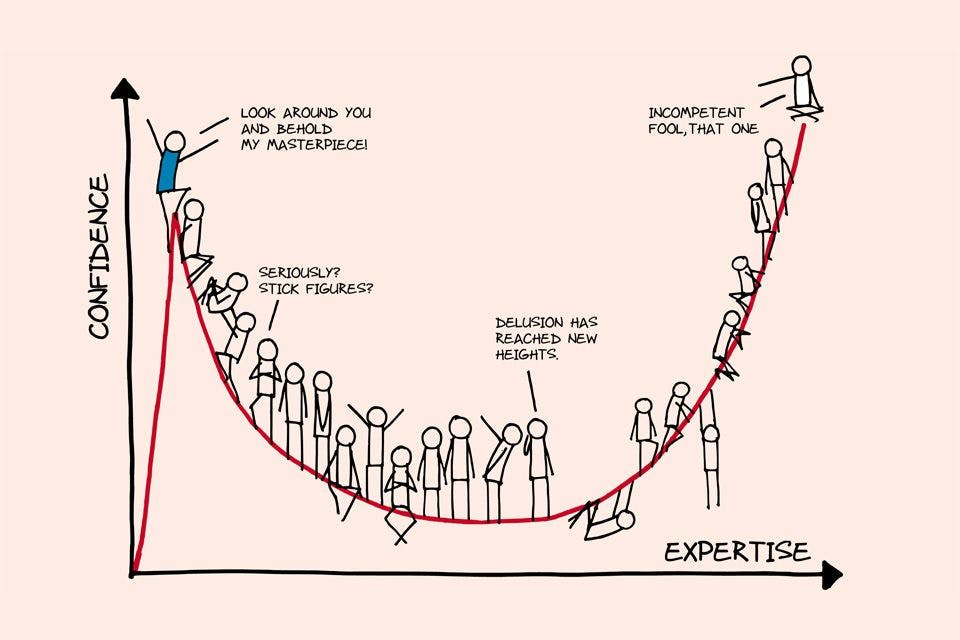reMarkable 2 - what is it and why you should buy it?
November 18th, 2023
•
10 min read

There are many myths about programming, we will try to debunk a few. In addition, I'll share you some tips I wanted to hear about when I started 💼
May 17th, 2024
•
8 min read

Whether you're looking to jumpstart your career or just wanting to learn something new, programming is a skill that can open up a lot of doors. The great thing about it is that it's easy to get started, but the journey to becoming a master coder can be challenging. Here, we will talk about the common roadblocks you may encounter and how to overcome them. Moreover, I hope to dispel some myths, let's start! 🚀
Beginning anything new can be intimidating and difficult, especially in programming, where there is often a steep learning curve and a lot of new information to absorb. It can be overwhelming to try to wrap your head around new concepts and unfamiliar terminology, especially if you're new to the field. It's easy to feel discouraged or frustrated when you struggle to understand something or encounter errors or bugs in your code.
Remember, everyone has to start somewhere. With time, patience, and practice, you'll improve and become more comfortable with programming. Don't be afraid to ask for help or seek out resources to guide you through the learning process. It may be a challenge at first, but the rewards of programming are well worth the effort ✨
Finding motivation can be a challenge when you are faced with a difficult or tedious task, and this is so true when it comes to programming. One way to stay motivated is to keep your goals in mind. Whether you are learning to program for a new career, to solve a specific problem, or simply for personal fulfillment, reminding yourself of the reasons why you are doing this can help you stay focused and motivated 💪
Another way to find motivation is to break your task into smaller, more manageable chunks. This can help you feel a sense of accomplishment as you make progress and can also help to prevent feeling overwhelmed. It can also be helpful to set deadlines for yourself, or to work with a study group or mentor who can provide support and accountability. Lastly, don't be afraid to take breaks and reward yourself when you complete a task or reach a milestone. This can help to keep you energized and motivated to keep going. (trust me it works, I've tested it 😉)

Focusing on one direction or technology while learning programming can be incredibly beneficial, but it can also be a challenge, especially in a field that is constantly evolving and introducing new technologies. It's easy to get lost in the multitude of options and feel overwhelmed by all the different paths you could take. However, it's important to remember that it's better to master one thing than to try to learn everything at once. Of course, by one I don't mean only HTML (today you're probably cannot be just HTML developer 😛).
It can also be helpful to surround yourself with like-minded people who are also focused on a similar direction or technology (I will tell you more about it later). This can provide support and accountability, and can also help you stay up to date with the latest developments in your chosen field.
Ultimately, it's important to remember that learning programming is a journey, and it's okay to change your focus or explore new technologies as your interests and goals evolve. Just try not to get too lost in tools and remember to stay focused on your long-term goals.
Contrary to popular belief, math isn't necessarily a requirement for success in programming. While a strong foundation in math can certainly be beneficial in certain areas of programming, such as data analysis or machine learning, it isn't a necessity at all. Many successful programmers have achieved their goals without a degree in math or a strong background in mathematics.
There are many myths surrounding the role of math in programming and the idea that one must be a "math person" to be successful in this field. However, these myths are not supported by the reality of the industry. Programming is a skill that can be learned and improved upon through practice and experience, and it's often more important to have a strong understanding of programming concepts and languages than it's to have a strong foundation in math.
In short, while math can certainly be helpful in programming, it isn't a necessary requirement for success in this field. With dedication, hard work, and the right resources, anyone can learn to program, regardless of their math skills or previous experience.

Code review is an important aspect of the programming process, and it is especially valuable for those who are learning to program (but not only!). Receiving feedback on your code can help you improve your skills, identify and fix mistakes, and learn best practices.
One of the key benefits of code review is that it provides an opportunity for others to review your code and offer constructive feedback. This can help you learn from more experienced developers and get a fresh perspective on your work. It's important to remember that we are not our code, and receiving feedback is an opportunity to learn and grow, rather than a personal attack.
It's also important to note that everyone can give code review, regardless of their level of experience or expertise. Everyone has something to contribute and can offer valuable insights and suggestions (not only seniors 👴).
Code review can help identify areas for improvement and provide guidance on how to address those areas. Overall, code review is an essential part of the learning process and can be beneficial for developers of all levels.
Experience is probably the most important factor in programming, as it helps you to develop a deeper understanding of different programming languages and technologies, as well as the ability to solve complex problems more efficiently. But, you probably ask the question now: “How to gain experience before my first job?” - good point 👏
Gaining experience can be done through various methods, such as working on personal projects, participating in hackathons, or contributing to open source projects. Contributing to open source is a great way to gain experience in programming, as it allows you to work on real-world projects with a diverse group of people, which can provide valuable insights and expose you to new ways of thinking.
Collaborating with others on a project can also help you to gain experience working with a team, which is an important skill in any programming career.
Participating in developer communities, whether online or in-person, is another excellent way to gain experience and connect with other programmers who can share their knowledge and expertise with you.
All of these activities can help developers to build their skills and confidence, and ultimately become more successful in their careers, so don't cry that you don't have any place to learn and gaining experience - just take your chance! 💪

Sounds prosaic, but it's really the most important thing in this whole game. By actively applying what has been learned through hands-on practice, developers can better understand how to implement solutions and troubleshoot issues.
It's important to not only practice when learning programming, but also to practice consistently. By consistently setting aside time to practice, developers can gradually improve their skills and become more proficient in their work.
It's also helpful to vary the types of practice activities, such as casual projects, hackathons, more algorytmic katas.
But please, be aware that learning programming, like any skill, takes time and dedication. While it's possible to make progress quickly with the right mindset and effort, it isn't realistic to expect to become a proficient programmer (with huge salary 🤑) within a short period of time, such as a few weeks or a month.
Bootcamps and courses that claim to make you a programmer within a short period of time may not (and they don't!) provide a comprehensive education in programming and may not give you the skills and experience you need to succeed in the field.
To speed up the learning process, it's helpful to set clear goals, establish a consistent study schedule, and actively practice and apply what is being learned. By adopting a proactive and dedicated approach to learning, you can make visible progress and become a proficient programmer over time ⏱️
To sum up, programming isn't a piece of cake, but a tedious process that requires really hard work. But don't give up!
Below I have collected the most important tips, that I would like to hear at the beginning of my journey:
⏱️ Don't waste your time - focus on one technology/language and try to understand it as much as you can
💵 Don't think about money - if your only motivation is money, you'll quickly find out that it's not for you
🫂 Find community - try to find some helpful people which could mentor you and show you the right way
👷 Practise for the win - always make something and work on real problems, not only tutorials!
💪 Enjoy your work - without it, you will be unable to make a progress
😭 Don't worry about failures - everybody's been through it, why should you give up?
❌ You aren't your code - don't take comments about your code personally, someone who gives you feedback takes the time to help you
At the end, I leave you a quite interesting and very true graph describing the Dunning-Kruger effect, perhaps in difficult times it will help you determine your position and find motivation to continue. Keep progressing!
See you next time! 👋


Blogger, software engineer and the main coordinator of this website, he has lots of ideas and won't hesitate to use them! He lives in Poland.
If you find this helpful, you can also check out these posts